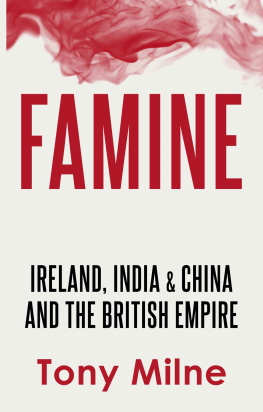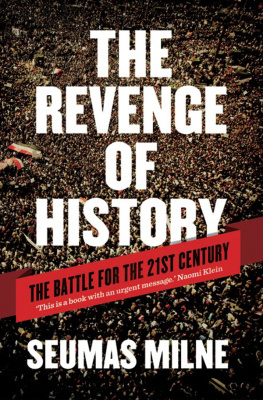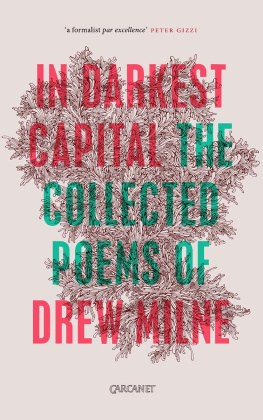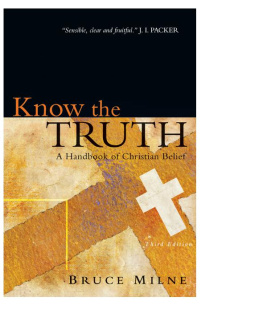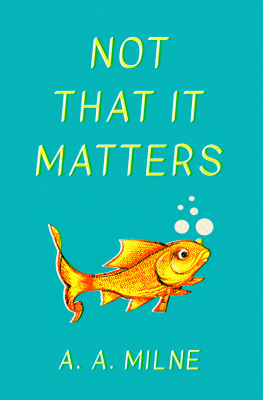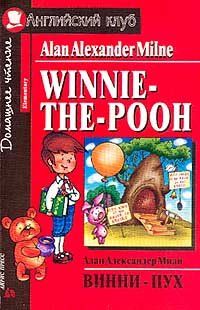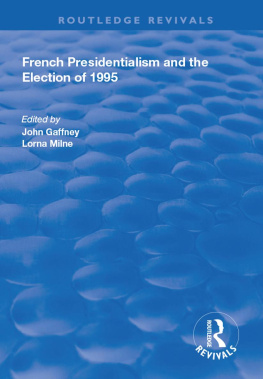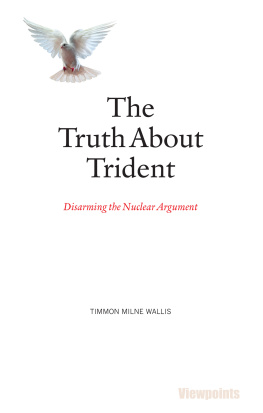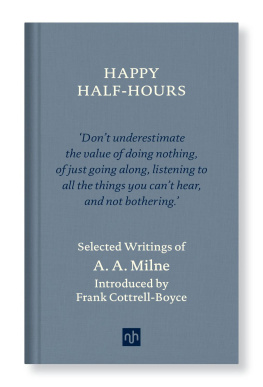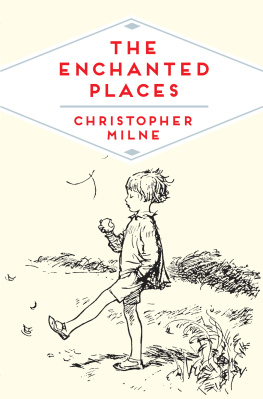Milne - Famine
Here you can read online Milne - Famine full text of the book (entire story) in english for free. Download pdf and epub, get meaning, cover and reviews about this ebook. year: 2021, genre: Politics. Description of the work, (preface) as well as reviews are available. Best literature library LitArk.com created for fans of good reading and offers a wide selection of genres:
Romance novel
Science fiction
Adventure
Detective
Science
History
Home and family
Prose
Art
Politics
Computer
Non-fiction
Religion
Business
Children
Humor
Choose a favorite category and find really read worthwhile books. Enjoy immersion in the world of imagination, feel the emotions of the characters or learn something new for yourself, make an fascinating discovery.
Famine: summary, description and annotation
We offer to read an annotation, description, summary or preface (depends on what the author of the book "Famine" wrote himself). If you haven't found the necessary information about the book — write in the comments, we will try to find it.
Milne: author's other books
Who wrote Famine? Find out the surname, the name of the author of the book and a list of all author's works by series.
Famine — read online for free the complete book (whole text) full work
Below is the text of the book, divided by pages. System saving the place of the last page read, allows you to conveniently read the book "Famine" online for free, without having to search again every time where you left off. Put a bookmark, and you can go to the page where you finished reading at any time.
Font size:
Interval:
Bookmark:
FAMINE
FAMINE
IRELAND, INDIA & CHINA
AND THE BRITISH EMPIRE
Tony Milne
Handmaid Books
Published by Handmaid Books
Published in 2021
Copyright Tony Milne
All rights reserved
All images by Tony Milne
This ebook edition by KDP
tonymilne.net
My theory of taxation as the primordial driver of human society explains perfectly the rise and fall of the English state and of the British empire. Some of the reaction to my history of England was criticism of a perceived anti-English attitude. While any balanced history ought to cover both positive and negative aspects, I attempted in preparing a history of the British empire to cover both sides of the story in separate sections rather than mixed together in a chronological or geographical structure.
The combination of Britains rise to greatness, and the problems this created for certain groups of people, were the themes of that great book. However, each grew to be large enough on its own and too unwieldy for a single book. As a result, I separated the good from the bad, and this book is what remains of the latter, the chapter on famine, which covers the famines of Ireland, India and China.
Britain has a history of suffering that covers transportation, popular riots put down by militias, strikes and strike breakers, religious and labour oppression. Britain invented the modern prison, a tool of psychological torture copied the world over, and the concentration camp. However, relative to the condition of poor people at the time, and compared to other countries in Europe and elsewhere, Britain remained a peaceful country, with a benevolent government and a level of personal freedom that was the envy of the intellectual world that might appreciate it. Britain was certainly a considerably better place to live than England had been in its catastrophic Tudor excesses. In any case, much of these subjects, and labour, prisons and press gangs especially, have been covered extensively by others and I could add nothing to a catalogue of human disasters that does little to explain human behaviour.
In famine, however, there were two aspects that appeared unique to my contribution. The first was the role of Britain in the famines of China. The second was the role of taxation as a human behaviour in the famines of India and Ireland, and of famine in general.
The United Kingdom included Ireland and the official British Empire included India, but there was also an unofficial British empire, wherein it operated its hegemony, and which included China. The famines of China are not a new subject for study, but they are usually blamed on native excesses, rebellions and natural causes, not on Britain and its role in controlling the imports, exports, customs and duties of China, nor even of its operation of a monopoly of violence therein.
As for my second contribution, I found in preparing this work that all previous books and research are either dualistic, seeking to blame individuals, organisations, governments or countries, to apologise for or defend them, or are naturalistic, seeking phenomena ex machina that somehow abrogate human responsibility for the deaths of millions. Neither approach is successful. Famines are difficult to define precisely, and attempts to correlate them with either political or natural phenomena fail at the first level. Famines neither appear in chronological cycles nor in political ones.
My theory of taxation should explain the terrible experience of Chinese, Irish and Indian natives, who succumbed to multiple famines during their period of British domination. It should provide a convincing explanation of human behaviour and the conditions under which it leads to famine, as well as explaining why most of the time such behaviour and conditions dont. This books sets out to explain famine through the history of British taxation and its application in Ireland, India and China.
Tony Milne
Paris, France, 2021
it is very well known that they are every day dying and rotting by cold and famine, and filth and vermin, as fast as can be reasonably expected
The British Empire was the most successful of the European colonial enterprises in terms of size administered, population taxed, and duration. While China was not officially a British colony, apart from Hong Kong and several treaty settlements, Britain and British administrators controlled its most important taxation, the land and maritime customs, and decided what could be imported and exported, if necessary by force of arms, commanding the most powerful military forces at sea, up the rivers and on Chinese soil.
During Britains control, Ireland, India and China suffered appalling famines that killed more people than any other political enterprise apart from the Mongol invasions.
Taxation forms the basis for this analysis of the worst aspect of Britain's colonial heritage. British taxation was inherited from the great Norman organisation that had made its perpetrators the richest men in the world, and had led to famine in England in the years following the Conquest. This made them particularly sensitive to expenditure, and focused it on those activities that granted them the greatest return from their investments.
Great Britain spent most of its tax revenues financing the largest professional military navy in the world. This navy protected the trade which came to dominate Britains economy in the years before industrial production took over. Britain benefited during the Age of Sail from its geography, having one of the longest coastlines for its size, and a fortunate position for winds and tides.
Leveraging the protection provided by nature and tax revenues, British trade and then industry grew faster than that of any other country in the world. The population also grew faster than that of any other country and, while not as large as that of France, India or China, it was still one of the largest populations in the world. The heterogeneous nature of Britain, with its English middle class, its Scottish and Dutch aristocracy, its Scottish and Huguenot technocracy, its Scottish lawyers and economists, and its Irish writers, made it a peculiarly tolerant and inclusive country. This facilitated further improvement in its agriculture, technology, education and trading networks.
From the time of the Union with Scotland in 1703, which coincided with the addition of Ireland in what would become a lop-sided United Kingdom, Britain drove the creation of the largest colonial empire the world had ever seen. Far from the technological powerhouse that it is seen as in retrospect, Britain did not start its industrial revolution until the 1750s, but it had already achieved its greatest victory, the conquest of Bengal, by 1757, and defeated the French in the Seven Years War by 1763. The industrial revolution was therefore the result of its efficient tax system, not the cause of the empire.
Just a few short years after conquest by the British, Bengal suffered its first famine. The same tax system in Britain that drove the industrial revolution was able to kill millions of its own tax-payers through purely economic means.
Although a demographic disaster, the economic success for individual Britons involved in the Bengal occupation led to similar developments elsewhere. What started as a commercial trading empire or an agricultural plantation evolved in Ireland, China and the rest of India into one of extraction to finance trade and banking investments elsewhere.
Britains success in Asia came long after that of the Portuguese, Spanish, Dutch and French. Driven by the economic and demographic growth of the homeland, a limitless supply of young men eager to succeed and powerfully armed established within a few years profitable trading factories in Bombay and Madras, conquered Bengal, and opened trade with China. Over a hundred years, they opened the doors to trade in China along the coast and along the mighty rivers a thousand miles inland. By then, famines in Ireland and India had made the news, and famine in China soon followed.
Font size:
Interval:
Bookmark:
Similar books «Famine»
Look at similar books to Famine. We have selected literature similar in name and meaning in the hope of providing readers with more options to find new, interesting, not yet read works.
Discussion, reviews of the book Famine and just readers' own opinions. Leave your comments, write what you think about the work, its meaning or the main characters. Specify what exactly you liked and what you didn't like, and why you think so.

